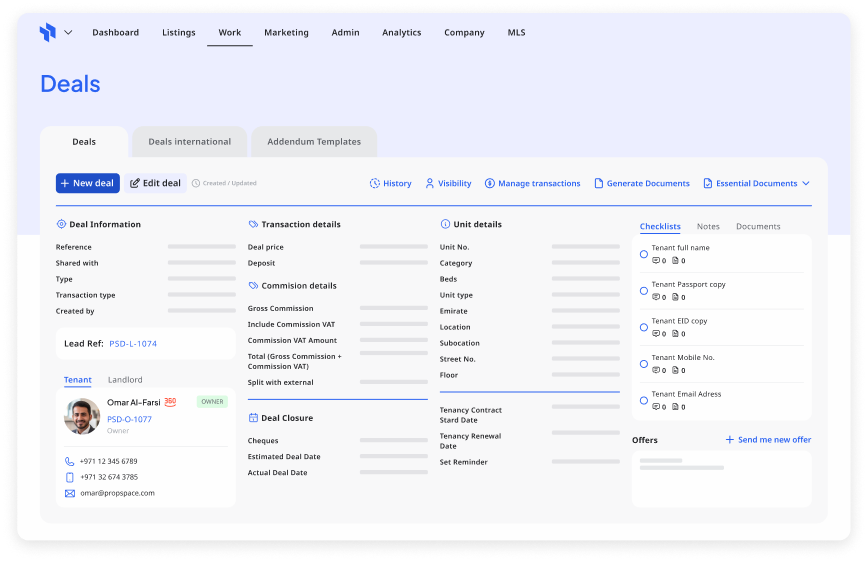How many clients are you juggling right now?
As you manage multiple clients at a time, you’re also preparing contracts, creating listing presentations and setting meetings with developers. Sometimes, you work 16- to 18-hour days just to get everything done. But there’s an easier way to keep up with clients and master your schedule while staying on top of your game. That way is through CRM for real estate client management.
A customer relationship management (CRM) system is a powerful tool that organises and tracks all client information and automates tasks to eliminate inefficiencies.
Let’s take a closer look at this powerful business tool.
CRM and Client Retention: What’s the Connection?
Real estate is about building relationships, cultivating trust so that clients stay with you in the long term. They might start out as renters, but they may eventually become buyers, and turn into loyal clients who refer other clients to your business. Building and maintaining strong relationships takes consistent engagement at every interaction, from the first enquiry to post-sales support.
A CRM system for real estate helps you track every interaction. It lets you respond promptly and anticipate your clients' needs through relevant insights. The connection between CRM and client retention is about providing consistency and personalisation that makes clients feel valued.
Here’s how CRM improves client loyalty.
- Personalised experiences tell clients you understand their pain points, preferences and needs.
- Timely communications allow you to send emails or make phone calls, preventing missed opportunities.
- Streamlined processes ensure everyone on your team is on the same page about clients’ needs and issues.
- Tracked client feedback and interactions let you identify issues before they create big problems.
- Automated follow-up actions allow you to strengthen relationships that increase loyalty and lead to referrals.

The Features of CRM Tools
How does a CRM work? What features can you expect from the software?
CRM features will vary according to the tool you choose. There are CRM tools for real estate brokers and property managers. Some CRMs are designed for smaller real estate businesses and a few focus on the luxury real estate market.
Generally, you’ll find these features on CRM for real estate businesses.
Leads Management
The Dubai property market is thriving. There’s more than enough demand to match the supply as the population grows and more developments are made. That means managing multiple leads at a time. Understandably, you don’t want to miss one opportunity. CRM will help you with this goal.
This lead management tool will centralise and manage all property enquiries from several sources. You’ll be able to find, match and send the right property to the right prospects. It can even allow you to score leads and predict which ones have the most potential to close, helping your team prioritise the most valuable opportunities, close more deals, and increase conversion rates by 30%.
Marketing Integration
Marketing and advertising your real estate business can be time-consuming. Between the showings and meetings, when will you be able to create brochures or run a social media campaign for a new listing?
One of the benefits of CRM in real estate is that it allows you to build your brand. The tool helps you streamline marketing workflow by creating targeted and engaging ads or listings on social media. It can also help you create effective SMS and email marketing campaigns.
Deals Management
Contracts, invoices, receipts — keeping track of all real estate documents can be overwhelming. But ‘paperwork’ is a necessary task. However, CRM can simplify this task, letting you generate documents and saving you time while you close more deals.
The real estate tool can also help you track rental and sales deals, monitoring individual commissions as you go.
Customised Reports
Market insight is a key driver in successful decisions. You need to have the right data at the right time to land those lucrative listings and close deals.
CRM for real estate isn’t just about client satisfaction. It’s also about spotting patterns and trends that empower your team and give you an edge over competitors. You gain critical business insights with the tool’s customised and automated reporting feature.
At a glance, you’ll have data on the most popular locations around Dubai (or across the UAE), lead-to-showing conversion rates, supply-to-demand ratios, and other relevant metrics.
CRM tools also automate your real estate work, from messaging to new clients to scheduling follow-up meetings with other agents. It can also customise deal pipelines, letting you separate buyers from sellers and automating actions when a deal moves from one stage (e.g., offer sent) to another (e.g., under contract).

Maximise Client Value With CRM
Why invest in CRM for real estate?
An investment gives you more capabilities to manage more clients. You’ll have more time to build and maintain relationships without feeling exhausted. With the right CRM in place, you can attract and retain clients and drive long-term growth.
Keep up with clients and master your schedule with PropSpace.
Our CRM will help your real estate business attract, engage and retain clients.
Contact us today to find out how we can help you streamline your real estate operations.









